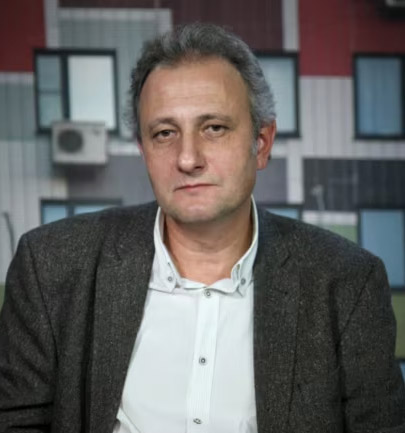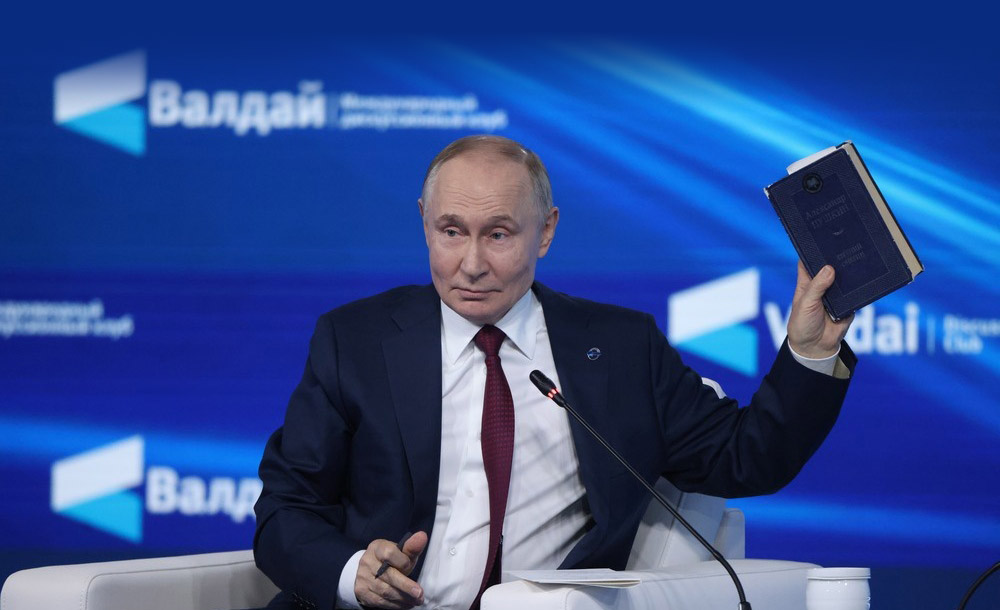 The surrounding world is full of allusions. It is a cluster of quotes that comment on today. In fact, this is the meaning of postmodernism. Nothing remains except for yesterday's and the day before yesterday's quotes. The world repeats itself. And everyone finds something in the past that explains or illustrates what is happening now.
The surrounding world is full of allusions. It is a cluster of quotes that comment on today. In fact, this is the meaning of postmodernism. Nothing remains except for yesterday's and the day before yesterday's quotes. The world repeats itself. And everyone finds something in the past that explains or illustrates what is happening now.
Putin found the allusion he needed in the 'Borodino Anniversary' of 1831, actually written in connection with the capitulation of Warsaw. Minister Lavrov has already read on camera the poem of the same year 'To the Slanderers of Russia' ('The Dispute of the Slavs Among Themselves'). Everything has specific historical reasons. Alexander Sergeyevich, who entered the service of Tsar Nicholas ('He gave me a salary') was then agitated and angered by the Polish uprising — Benckendorff was delighted with the controlled poet. In a letter to Elizaveta Khitrovo, Pushkin irritably wrote: 'Of all the Poles, only Mickiewicz interests me'. Well, Alexander Sergeyevich was hurt and shocked by Adam Mickiewicz's sharp and fair poem 'To Russian Friends' (literally: 'To the Muscovites' — 'Moskali'):
'...Perhaps, blinded by gold and rank,
One of you, friends, is punished more severely by heaven;
Perhaps he betrayed reason, honor, and conscience
For the generous favor of the tsar or a nobleman...'
But was it easy for Pushkin himself under the constant, meticulous, long-term supervision of despotism? As he himself wrote in one of the letters of the 1830s: 'To cleanse Russian literature is to clean latrines and depend on the police'. In short, everything is much more complicated than in the view of our new Pushkin scholars Putin and Lavrov, who mobilized Pushkin for the Special Military Operation.
What can be said: at least, one can only welcome the transition from quoting Ivan Ilyin by the top leadership to Pushkin. However, the liberal political philosophy of the early Alexander Sergeyevich will not melt the hearts of the Kremlin inhabitants, they considered and consider the subordinate population to be a 'herd', it 'should be cut or sheared'.

Vladimir Putin read to the forum participants Pushkin's poem 'Borodino Anniversary': Photo: Konstantin Zavrazhin / RG
And now Pasternak can only be quoted by non-'foreign agents' (as explained by the lawyers of the poet's heirs in connection with the compilation of an anthology of Russian poetry by Alexander Arkhangelsky, a 'foreign agent'). Well, let them quote, for example, the poem 'Nobel Prize' — 'I disappeared, like a beast in a cage'. Perhaps a significant part of the current Russian leadership saw his poems in the seventies-eighties during a search at the suspects in typewritten versions, on thin tracing paper, in homemade bindings.
'Arbat, My Arbat'
In short, allusions are relative, but sometimes, forgive the banal comparison, they strike like lightning. It is precisely such a worn-out emotion in bad literature that applies to the sudden hitting of a quote at a certain time and place. Imagine walking along Arbat three years after the 'partial mobilization', and suddenly a street musician, and a good one, strikes the strings of a guitar — and Viktor Tsoi starts playing, who suddenly reads completely anew:
'...And two thousand years of war
War without special reasons
War — the business of the young
A remedy against wrinkles
Red-red blood
In an hour it's just earth
In two, flowers and grass on it
In three, it is alive again
And warmed by the rays of a star named Sun...'
Involuntarily you look for your native police, even more native informers. And you stand as if rooted to the spot:
'...And we know that it has always been so
That those who live by other laws
And who are destined to die young...'
Maybe, of course, this talented guy about 35 years old didn't mean anything like that. After all, here on Arbat, where they just dismantled the summer Sobyanin jungles, through which it was literally impossible to get through, there is the 'Tsoi Wall'. Although the musician settled symbolically at the very mouth of the street, a hundred meters from the frowning eyebrows of the eternally angry Ministry of Foreign Affairs condemning the entire Western world.
However, those passing by, those who 'tap with their heels, hurry on business', do not all understand the meaning. More precisely, they do not want to understand. Most of the nation is not so much 'going together' as 'going past'. So even if they understand, they move on. Well, Tsoi, well, the late 1980s, so what... 'War without special reasons... Two thousand years...' No one means anything. It was all a long time ago. But the nation was the same, many of those who sang for Tsoi then have not even all retired yet:
'...Changes are demanded by our hearts
Changes are demanded by our eyes
In our laughter and in our tears, and in the pulsation of veins
Changes, we are waiting for changes...'
Changes were not liked by 'the old men who rule the world' from Galich. Both then and now they rely on the fear of them, which Tsoi also sang about:
'...Cigarettes in hand, tea on the table
Thus the circle closes
And suddenly we are afraid to change something...'
That's the calculation.
And Gits in the Train in Russian
And here we see the very person from Alexander Arkadyevich Galich's 'Unfinished Song':
'...According to the certificate issued by the Ministry of Foreign Affairs,
From seventy and above...'
And here he tells about the treacherous West, about how the Poles (hello to Pushkin) did not yield the Danzig Corridor to the Germans, and therefore the Germans attacked Poland. A continuous 'and gits in the train', as the nation that burned in the furnaces of this attack said — that is, a repetition of the past for the hundredth time.
But there is a problem here. The Soviet government also said a lot, repeated a hundred times, at political information sessions, as now during the 'Conversations about Important Things', in the 'Vremya' program, in newspapers. It went in one ear to fly out the other. But still, nothing flew to Denmark, Norway, Sweden, Germany, not to mention Poland, and did not stop the work of European airports. Only occasionally something loomed, otherwise where is this from:
'...Something flew in the sky
Of silvery metal.
A lot in our days
Unidentified stuff...'
And yet. The Soviet Union was heavy, but not fussy. A. A. Gromyko, instructing O. A. Troyanovsky during his appointment as the USSR representative to the UN, told his colleague: do not get distracted by trifles, do not react to every sneeze of a probable or improbable opponent, speak only solidly and on major issues, because the Soviet Union is a great power.
That's the difference. The USSR failed, but it was assessed by its probable opponent as something impressive and solid. There were, of course, 'umbrella stabs', but still, they did not get distracted by trifles. So that in the sky of Denmark during the period when the current assistant to the president for international affairs, Yuri Ushakov, was just mastering (perfectly, as his close Danish colleagues say) the Danish language, 'stuff of silvery metal' flew on an industrial scale — this did not happen.
The question is why open another front — hybrid, when the first is not closed? This is not a question of political science. This is not a theory of regimes. This is not a problem at the level of Nobel laureate in economics Daron Acemoglu. These are 'psychology questions': someone lacks 'movement'. This is what Putin himself said in December 2024, discovering the true 'root causes' of conflicts: when everything is calm in Russia, we 'want movement'. Now, in September 2025, he said otherwise, but about the same: 'The world, of course, you will agree with me, looks dull when it is monotonous'. And here is 'Oreshnik', the Chernobyl and Zaporizhzhia nuclear power plants on the brink of disaster, drones in Europe, 'shadow fleet' tankers scurrying back and forth.
Such a world cannot be called monotonous. Not that it is polycentric, because Russia is not yet recognized as a pole by another pole, which calls it a 'paper tiger', but it is certainly excessively polyphonic. However, the West is still to blame for everything.
All the way, communicating with Putin, the moderator, an international journalist, a connoisseur of the Swedish language Fyodor Lukyanov tried to joke, but the jokes did not pass, since the anthropological structure of the questioner and the respondent must coincide (option — the questioner must be a woman with crossed legs or Carson Tucker). But he did not dare, being bound by loyalty, to somehow still ask about the West — well, hasn't it given us something else? The suits we sit in on the podium, the podium itself, the microphone we speak into, the devices that transmit this long event to the unfortunate nation? And the leader speaks, speaks, speaks...
What can be said here? Only to quote, since we are dealing with literary questions here, our Alexander Arkadyevich:
'...Do not fear prison, do not fear poverty,
Do not fear plague and famine,
But fear only the one,
Who says: 'I know how it should be!...'
* Andrey Kolesnikov is considered a 'foreign agent' by the Ministry of Justice of the Russian Federation.